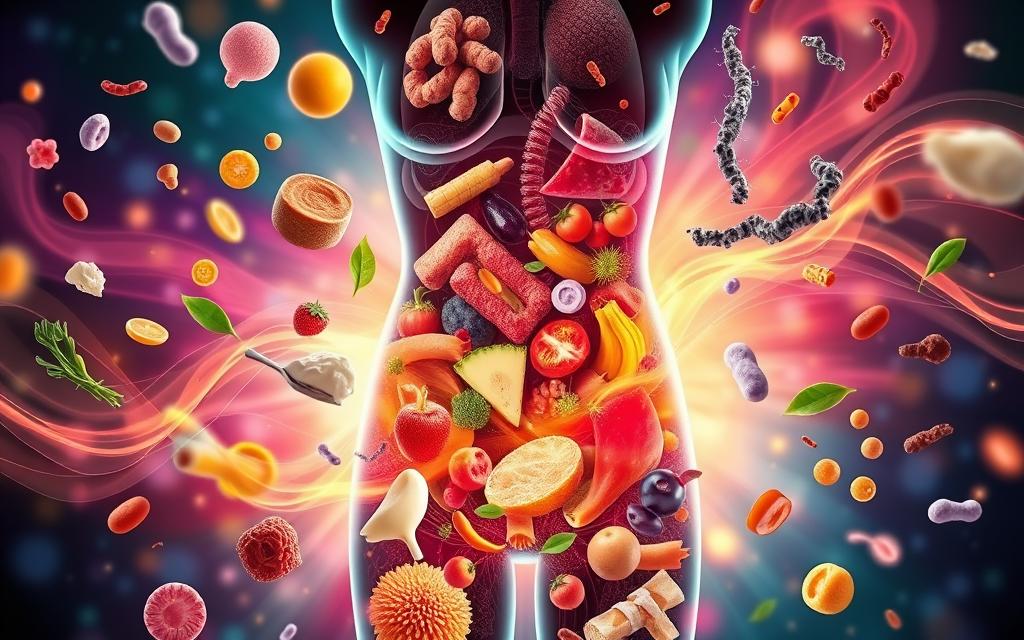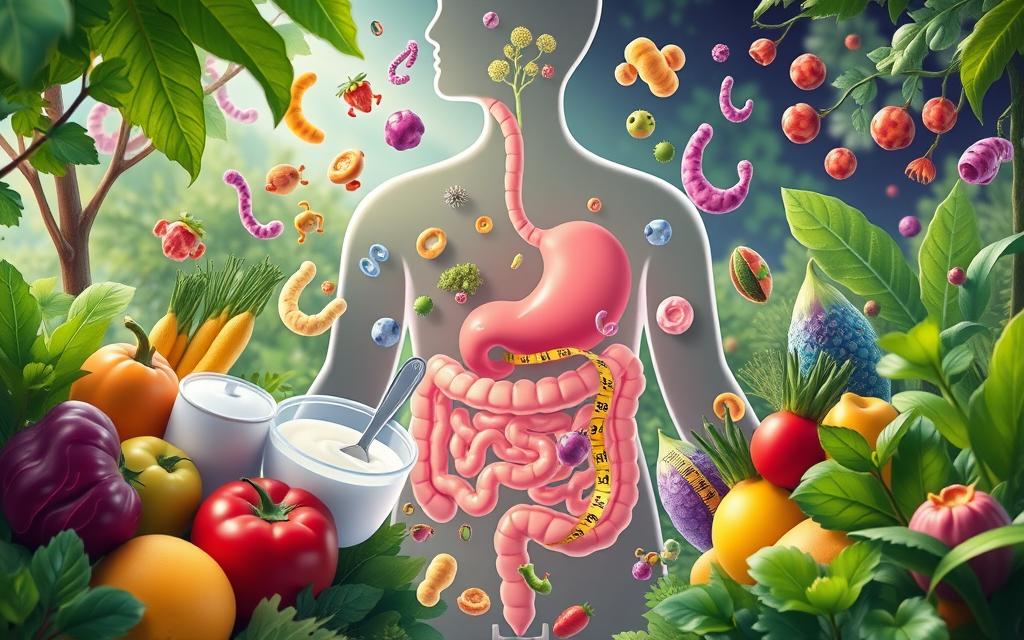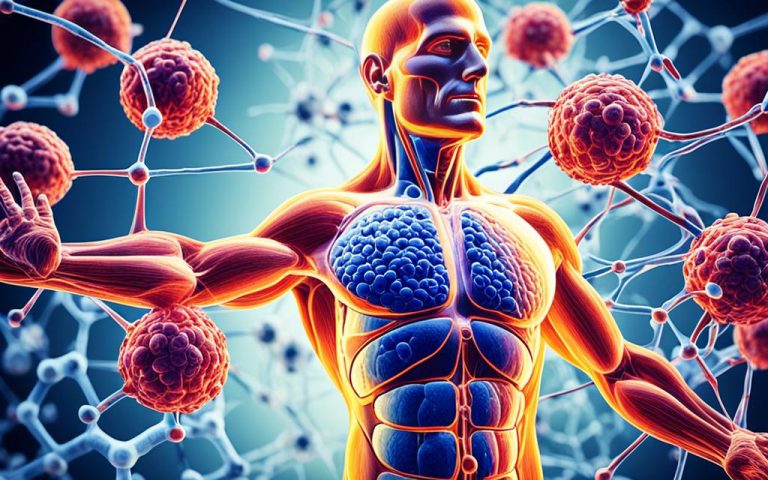Probiotics for Weight Loss: What You Need to Know
Are you curious if probiotics can help you lose weight? Many people are now exploring probiotics for their potential in managing weight and improving gut health. Let’s look into what science says about their role in losing weight.
Probiotics are live bacteria that are good for your health when eaten. They’re in fermented foods and supplements. Studies hint that they might help with weight loss, especially around the belly. The link between gut health and weight loss is getting clearer as research goes on1.
Your gut is filled with trillions of bacteria, known as the gut microbiome. This group of bacteria is key to your health, including how you manage your weight. Interestingly, people who are overweight often have fewer types of gut bacteria than those who are at a healthy weight2.
Some studies suggest probiotics could help with weight loss, but results differ. A review of 15 studies showed that probiotic supplements helped with weight loss and cutting down body fat, but the effects were small2. Yet, not all studies agree. Some experts looking at four studies found no big weight loss with probiotic supplements2.
The market for probiotics is growing fast, expected to hit over $64 billion by 20231. But remember, probiotics aren’t a quick fix for weight loss. They work best with a healthy diet and lifestyle.
Key Takeaways
- Probiotics may aid in weight loss and belly fat reduction
- The gut microbiome plays a role in weight regulation
- Research on probiotics and weight loss shows mixed results
- Probiotic effectiveness can vary based on strains and individual factors
- A balanced diet and lifestyle are crucial for optimal results
- Consult a healthcare provider before starting probiotic supplements
Understanding Probiotics and Their Role in Health
Probiotics are live microorganisms that are good for your health when eaten in the right amounts. Your gut is home to over 100 trillion microbes, which are key to your well-being3.
What are probiotics?
Probiotics are good bacteria that help your digestive system and overall health. They break down fiber, make vitamins, and help absorb nutrients. These tiny helpers can also help control your weight and metabolism4.
Natural sources of probiotics
You can get probiotics from fermented foods that help with weight loss, like:
- Yogurt
- Kefir
- Sauerkraut
- Kimchi
- Kombucha
Eating these foods often can boost your gut health naturally. If you can’t get enough probiotics from food, there are supplements available.
Health benefits of probiotics
Probiotics have many health benefits, not just for weight control. They improve digestion, boost the immune system, and may lower heart disease risks4. They can also reduce inflammation and protect against obesity-related diseases.
Research shows that some probiotics can help overweight or obese people lose weight and reduce body fat. They can also affect how much you eat and how much energy you use by making short-chain fatty acids43.
But remember, probiotics may not work the same for everyone. The amount you take, how long you take it, and your body’s response can all affect how well they work3.
The Gut Microbiome and Its Connection to Weight
Your gut microbiome is key to managing your weight. It’s a complex mix of bacteria in your digestive tract that affects how you process food and store fat. Studies show that obese people often have different gut bacteria than those who are at a healthy weight5.
The gut microbiome has over 1,000 types of bacteria, like Bacteroidetes and Firmicutes. These tiny creatures play a big role in your health and help control your weight. Research says the gut microbiome is more important for weight than your genes5.
Some bacteria can make it harder to lose weight. For instance, more Prevotella than Bacteroides in your gut is linked to losing weight and body fat5. This shows how important it is to keep your gut microbiome diverse and balanced for good weight management.
“The gut microbiome is like a hidden organ, influencing our health in ways we’re only beginning to understand.”
Recent studies found certain gut bacteria linked to lower weight and less belly fat5. These findings suggest that a healthy gut microbiome could be a key to keeping a healthy weight.
| Gut Bacteria Type | Association with Weight |
|---|---|
| Prevotella | Easier weight and fat loss |
| Bacteroides | Less favorable for weight loss |
| Beneficial gut bugs | Lower weight and reduced belly fat |
Knowing how gut bacteria and metabolism are connected is key to managing weight well. By eating right and living healthily, you can help your gut microbiome. This can improve your weight and overall health.
How Probiotics May Influence Body Weight Regulation
Probiotics are key to keeping your gut healthy and might help with weight control. They can affect your metabolism and how your body stores fat.
Impact on Appetite and Energy Usage
Probiotic bacteria make short-chain fatty acids in your gut. These can change how much you eat and how your body uses energy. Some studies suggest certain probiotics can make you feel full longer, which might cut down on calories6.
Effects on Fat Absorption and Storage
Some probiotics might lower fat absorption in your intestines. They could also increase fat excretion in your stool. This could mean less fat is stored in your body over time6. Studies show obese people often have more Firmicutes bacteria in their gut than those who are not obese7.
Influence on Hormone Regulation
Probiotics can change hormones that control hunger and fat storage. They might increase GLP-1 and PYY, hormones that make you feel full after eating. Some probiotics could also boost ANGPTL4, a protein that helps control fat storage6.
Your gut is home to about 10^14 bacteria and archaea from over 1,000 species. Bacteroidetes and Firmicutes are 90% of these bacteria7. This mix of bacteria is crucial for how your body handles food and stores fat. It shows how probiotics could be useful for managing weight.
Can Probiotics Help You Lose Weight?
Many people wonder if probiotics can help with weight loss. Recent studies show a possible link between probiotics and managing weight. But, the results are not clear-cut.
The ZOE’s PREDICT program looked at over 10,000 people. It found that some gut bacteria are linked to more belly fat. Yet, it also found 15 “good” gut bugs that are good for health8.
People who carry extra weight have different gut bacteria than those who are at a healthy weight. This hints at a link between gut health and body weight89.
A 2017 review in Obesity Reviews showed that probiotics might help with weight and fat levels, but the changes are small. Yet, other studies say probiotics don’t help with weight loss810.
Probiotics might not be the magic pill for losing weight alone. But, they could help with gut health. The TwinsUK study found that eating yogurt changes gut bacteria and reduces belly fat8.
Experts say eating a diet full of fiber is key for good gut bacteria and health. Sadly, only 7% of US adults eat enough fiber, showing how important diet is over supplements910.
| Factor | Impact on Weight | Evidence |
|---|---|---|
| Probiotics | Mixed results | Small reductions in body weight and fat percentage |
| Diet | Significant impact | Higher effect on body composition and weight |
| Exercise | Essential | Jumpstarts fitness and weight loss |
Research on probiotics and weight loss is ongoing. But, a balanced diet, regular exercise, and good gut health might be better for weight control. Always talk to a doctor before changing your lifestyle.
Specific Probiotic Strains Associated with Weight Loss
Some probiotic strains have shown great promise in helping with weight loss. Let’s look at the top strains and their benefits for losing weight.
Lactobacillus Family
The Lactobacillus family has strains that help with weight loss. Lactobacillus gasseri SBT2055 reduced body weight, belly fat, and waist size after 12 weeks11. Another study found that Lactobacillus gasseri BNR 17 lowered belly fat and waist size in 12 weeks11.
Bifidobacterium Strains
Bifidobacterium strains are also good for weight management. Bifidobacterium animalis subsp. lactis 420 may help by cutting down belly and belly fat and making you feel fuller11. A study showed that Bifidobacterium animalis subsp. lactis CECT 8145 reduced waist size, belly fat, and BMI in 12 weeks11.
Other Effective Probiotic Strains
Streptococcus salivarius subsp. thermophilus could help with weight loss and prevent weight gain on a high-fat diet for 4 weeks11. A mix of Bacillus subtilis and Bacillus coagulans, called AB001, was safe and worked well in a study with overweight people12.
| Probiotic Strain | Weight Loss Benefits | Study Duration |
|---|---|---|
| Lactobacillus gasseri SBT2055 | Reduced body weight, abdominal fat, and waist circumference | 12 weeks |
| Bifidobacterium animalis subsp. lactis CECT 8145 | Reduced waist circumference, visceral fat, and BMI | 12 weeks |
| Streptococcus salivarius subsp. thermophilus | Protected against weight gain on high-fat, high-calorie diet | 4 weeks |
Studies show that using probiotics for at least 12 weeks can help with weight loss11. To get the most out of probiotics for weight loss, eat foods rich in prebiotics like apples, bananas, and oats11.
The Science Behind Probiotics and Fat Reduction
Studies show a strong link between gut bacteria and metabolism. This link helps us understand how probiotics might aid in weight loss. A study with 58 obese Egyptian women showed changes in body composition and gut bacteria after 3 months of a weight loss program with probiotics13.
The study found more beneficial bacteria like Lactobacillus and Bifidobacteria. It also found less Firmicutes to Bacteroidetes ratio13. This change in the gut microbiome matches other research. It shows obese people have more Firmicutes and less Bacteroidetes than those with moderate weight14.
Probiotics can help reduce fat in several ways. They might affect how the body absorbs fat, leading to more fat excretion and less calorie intake. Some strains, like Lactobacillus gasseri SBT2055, are linked to losing visceral fat. In a study, people who drank probiotic milk lost 8-9% of visceral fat and 1-3% of belly fat over 12 weeks15.
Not all probiotic strains work the same for weight management. For example, Lactobacillus sakei reduced body fat mass and waist size in a 2020 study. Bifidobacterium animalis subsp. lactis also helped lower belly fat and BMI14.
| Probiotic Strain | Potential Effect on Weight |
|---|---|
| Lactobacillus gasseri | Significant impact on weight loss |
| Bifidobacterium animalis subsp. lactis | Reduction in belly fat and BMI |
| VSL#3 | May help prevent weight gain |
| Lactobacillus acidophilus | Potential weight gain promotion |
These findings are encouraging, but it’s key to remember that not all probiotics work the same way. Some might help you lose weight, while others could cause weight gain. We need more research to understand how probiotics, gut bacteria, and metabolism are connected14.
Probiotics and Their Impact on Belly Fat
Probiotics are now seen as a way to help lose belly fat. Studies show that some probiotics can cut down visceral fat. This type of fat is around organs and is linked to obesity and health problems.

A study showed women who took Lactobacillus rhamnosus supplements lost more weight than those on a placebo16. Another trial found people eating yogurt with Lactobacillus fermentum and Lactobacillus amylovorus lost 3–4% body fat in six weeks16.
Lactobacillus gasseri has been shown to help reduce waist size. Those with extra belly fat who ate fermented milk with this strain lost 8.2–8.5% belly fat in 12 weeks16. But, they gained the fat back after stopping the probiotics, showing the need for ongoing use.
For those looking at gut health for weight loss, certain probiotics have been proven to work. Bifidobacterium lactis B420, taken daily at 10 billion CFU, helped control body fat and shrink waist size over six months17.
| Probiotic Strain | Potential Benefits | Study Duration |
|---|---|---|
| Lactobacillus rhamnosus | Significant weight and fat loss | 12 weeks |
| Lactobacillus gasseri | 8.2–8.5% belly fat reduction | 12 weeks |
| Bifidobacterium lactis B420 | Reduced body fat mass and waist circumference | 6 months |
Probiotic supplements can be a good choice but their prices vary. They range from $0.97 to $2.00 per serving, or $42 to $60 per container, based on the product and brand17. It’s important to use them regularly to keep seeing the benefits in your weight loss efforts.
Combining Probiotics with Diet and Exercise for Weight Loss
Probiotics for weight loss work best with a healthy lifestyle. When you add probiotics to a diet and exercise plan, you see better results in losing weight and improving gut health.
Eating foods rich in probiotics or taking supplements, eating well, and staying active is key. Research shows probiotics can help you lose about 0.25 to 0.73 kg (0.5 to 1.6 lbs) on average. Some studies suggest they might even help you lose up to 1 kg (2.2 lbs) of fat18.
To get the most from probiotics for weight loss:
- Eat foods like yogurt, kefir, and sauerkraut that are high in probiotics
- Take a good probiotic supplement every day
- Follow a diet that is balanced and has the right number of calories
- Exercise regularly, aiming for at least 150 minutes a week
- Stick with your routine for at least 12 weeks18
Keep in mind, results can differ from person to person. A study found that women, not men, lost weight when taking Lactobacillus rhamnosus CGMCC1.3724 with a low-calorie diet18. This shows the need for a tailored approach to using probiotics for weight management.
Adding probiotics to your weight loss plan does more than help you lose weight. It also boosts your gut health. This approach can lead to lasting weight loss and better health over time.
Potential Risks and Side Effects of Probiotic Supplements
Probiotic supplements have many health benefits, but they can also have risks and side effects. Most people find them safe, but some may have bad reactions or problems.
Quality concerns
The probiotic supplement industry doesn’t have strict rules, which can be a problem. Some products might not have the bacteria they claim. To get a good product, choose well-known brands with independent tests.
Safety considerations for specific populations
If you have a weak immune system, have had surgery recently, or were in the hospital for a long time, be careful with probiotic supplements. The chance of getting an infection is very low, about one in a million for Lactobacilli bacteria and one in 5.6 million for yeast-based probiotics19.
Don’t take probiotics if you have severe acute pancreatitis because they could make things worse19. If you have health issues, talk to your doctor before taking probiotics.
Possible interactions with medications
Probiotic supplements might not mix well with some medicines. They could affect how antibiotics or drugs that weaken the immune system work. Always tell your doctor about any supplements you’re taking to avoid bad reactions.
Some people might get more gas, bloating, constipation, or thirst from probiotic supplements. These issues are usually mild and don’t happen often19. Some might get headaches from amines in probiotic foods, so they choose supplements instead19.
Some probiotic strains can make histamine in your gut, which can be a problem for those with histamine intolerance19. Also, some supplements might have allergens like dairy, egg, or soy, causing reactions in some people19.
Probiotic supplements can be good for your health, but think about the risks. Talk to a healthcare professional, especially if you have health issues or concerns.
Choosing the Right Probiotic Supplement for Weight Loss
Finding the best probiotic supplements for weight management can be tough. There are many options out there. It’s key to look at certain factors that make a supplement work well.
When picking probiotics for weight loss, search for products with proven beneficial bacteria. Lactobacillus and Bifidobacterium strains are linked to weight loss. Some top probiotics for weight loss have many strains, giving a wide range of benefits20.
Think about the colony-forming units (CFUs) in each supplement. A higher CFU count doesn’t always mean better results. But it can show how strong the supplement is. For instance, Ritual Synbiotic+ has 11 billion CFUs per serving, while VSL4 Gut Capsules have 30 billion20.
How easy a product is to use is also key. Probiotic supplements come in different forms, like capsules and powders. Garden of Life Dr. Formulated Probiotics Fitbiotic Powder is a powder with 50 billion CFUs. Culturelle Metabolism + Weight Management is capsules that are easy to swallow21.
| Product | CFUs | Form | Price |
|---|---|---|---|
| Garden of Life Fitbiotic Powder | 50 billion | Powder | $31.94 |
| Culturelle Metabolism + Weight Management | 12 billion | Capsules | $25.99 |
| Ritual Synbiotic+ | 11 billion | Capsules | $54.00 |
Cost is also a big factor. The price per serving of top probiotics for weight loss varies from $0.33 to $2.67. Some high-quality options like Ritual Synbiotic+ might seem pricey at $54 per bottle. But they offer subscription options for savings20.
Finally, think about storage needs and shelf life. Some probiotics, like Probulin TrimSynergy, last a long time, while others need to be kept cold. Pick a product that fits your lifestyle and storage situation21.
Probiotic-Rich Foods vs. Supplements: Which is Better?
Choosing between fermented foods and probiotic supplements can be tough. Both have their own benefits for gut health and weight management. Let’s look at the good and bad of each to help you decide.
Probiotic-rich foods like yogurt, kefir, and sauerkraut give you natural probiotics and important nutrients. These foods also have fiber, plant compounds, and micronutrients that boost your health22. But, not all fermented foods have live probiotics because of how they are made and stored22.
Probiotic supplements, on the other hand, pack a lot of specific bacteria strains. They let you target what you eat and can give you more types of bacteria than foods22. Many supplements don’t have allergens or added sugars, making them good for people with certain diets.
Studies show that gut bacteria help control body weight4. Some probiotic strains have been shown to help with weight loss. For instance, Lactobacillus gasseri has helped reduce weight, BMI, waist size, and fat in people who are overweight or obese4.
When choosing between foods and supplements, think about what you need and like best. Some folks might do well with both. Remember, probiotics work differently for everyone, and talking to a health expert can help pick the right ones for you22.
Adding both probiotic-rich foods and supplements to your diet could be the best way to go. It gives you lots of benefits for your gut health and weight loss.
The Role of Prebiotics in Supporting Probiotic Function
Prebiotics and probiotics help manage weight by supporting a healthy gut. Prebiotics are fibers that feed good gut bacteria, making probiotics work better. They give these beneficial bacteria the food they need.
Good bacteria in your gut boost your immune system and help fight obesity23. Bad bacteria and unhealthy gut flora are linked to a higher BMI23. Together, prebiotics and probiotics create a strong team for weight control.
Prebiotic-Rich Foods
Many foods are packed with prebiotics. Here are some top choices for your meals:
- Garlic
- Onions
- Leeks
- Asparagus
- Bananas
Studies show that prebiotic fiber is key for butyrate production in the colon23. Adding these foods to your diet is crucial.
Synergistic Effects on Weight Loss
A 2017 study in the Nordic region looked at prebiotics and probiotics for weight loss. It found that more gut bacteria meant more weight loss on a high-fiber diet24. This shows that the right mix of prebiotics and probiotics can boost weight loss.
Remember, prebiotics and probiotics are best used with a full plan for weight loss. Slow, steady weight loss is key for lasting results. Big changes from probiotics usually take 12 weeks or more24.
Future Research and Developments in Probiotic Weight Loss Studies
The study of probiotics for weight loss is moving fast. Studies show they can help with gut health and managing weight. A big review found that taking probiotics helped overweight and obese adults lose 0.5 kg and drop their BMI by 0.5425.
Scientists are looking into new types of probiotics and their effects. For instance, a study on Lactobacillus sakei from kimchi showed it helped obese Koreans lose body fat25. Another trial with Lab4P probiotics helped overweight adults lose weight25.
Future studies will focus on how probiotics affect weight and metabolism. Researchers want to tailor probiotics to each person’s gut microbiome. This could change how we approach weight loss.
This research could have a big impact worldwide. In 2016, over 1.9 billion adults were overweight, with over 650 million obese26. Every year, 2.8 million people die from being overweight or obese26. These numbers highlight the need for effective weight loss solutions.
| Probiotic Strain | Effect on Weight Loss |
|---|---|
| Lactobacillus sakei | Significant body fat reduction |
| Lab4P consortium | Notable weight loss |
| Lactobacillus plantarum Dad-13 | Promising results on gut microbiota |
As research goes on, we might see more specific probiotic supplements for weight control. Long-term studies will look at safety and effectiveness. This will help set clear guidelines for using probiotics in weight loss plans.
Conclusion
Obesity has become a big health issue lately. Studies show the gut microbiome is key to managing weight27. Probiotics can aid in weight loss by improving gut health. A 2019 review showed that those taking probiotics lost weight, with a 1.2 cm reduction in waist size28.
Probiotics look promising for weight control but aren’t a quick fix. Their success depends on the strain, dosage, and your gut’s makeup. A 2021 study of 27 papers found probiotics helped with weight loss in the overweight and obese28. But, they don’t stop weight gain on a high-fat diet completely.
For the best outcomes, use probiotics with a healthy diet and exercise. A study with 20 men found probiotics helped them gain less weight on a high-fat diet28. As research grows, use probiotics for weight loss with realistic hopes and expert advice. Remember, improving gut health is part of a bigger health journey.
FAQ
What are probiotics?
Probiotics are live microorganisms that help our health when we eat them. They are good bacteria found in supplements and foods like yogurt.
What are the natural sources of probiotics?
Foods like yogurt, kefir, and sauerkraut are full of probiotics. These are fermented foods that are good for you.
How can probiotics influence body weight regulation?
Probiotics can help control weight in many ways. They can change how we feel hungry or full, how we use energy, and how our body absorbs fat. They also affect hormones in our body.
Can probiotics help with weight loss?
Yes, studies show that probiotics can help with losing weight and cutting down body fat. This is especially true when eaten with a healthy diet and exercise.
Which probiotic strains are associated with weight loss?
Some probiotics, like Lactobacillus and Bifidobacterium strains, are linked to losing weight and reducing belly fat. Strains such as L. gasseri and B. animalis subsp. lactis are good examples.
How do probiotics contribute to fat reduction?
Probiotics can help reduce fat in several ways. They can change how we use energy from food, increase feelings of fullness, and affect how our body absorbs fat.
Can probiotics help reduce belly fat?
Yes, some probiotics, like Lactobacillus gasseri, can cut down on belly fat and waist size in people who are overweight or obese.
Should probiotics be combined with diet and exercise for weight loss?
Probiotics can help with weight loss, but they work best with a healthy diet and regular exercise. Combining probiotics with a nutritious diet and exercise is the best way to manage weight and stay healthy.
Are there any potential risks or side effects of probiotic supplements?
Probiotic supplements can have risks because they are not always regulated. They might cause stomach discomfort or interact with some medicines. Always talk to a doctor before starting probiotics, especially if you have a weak immune system or serious health issues.
How do I choose the right probiotic supplement for weight loss?
When picking a probiotic supplement for weight loss, think about the type of strain, how much you get, and its quality. Choose products with strains that help with weight loss and have enough CFUs. Make sure they are tested by third-party groups for quality.
Are probiotic-rich foods or supplements better for weight loss?
Both probiotic foods and supplements can help with weight management and health. The best choice depends on what you prefer and your diet. Some people might do well with both foods and supplements.
What is the role of prebiotics in supporting probiotic function?
Prebiotics are fibers that don’t get digested and feed good gut bacteria, including probiotics. They work with probiotics to keep the gut healthy and might make probiotics more effective for weight management.
Source Links
- https://www.medicalnewstoday.com/articles/probiotics-for-weight-loss-what-is-the-evidence – Are probiotics effective in promoting weight loss?
- https://zoe.com/learn/supplements-gut-health-and-weight-loss – Can Supplements Help With Gut Health and Weight Loss?
- https://www.webmd.com/diet/what-to-know-probiotics-weight-loss – What to Know About Probiotics for Weight Loss
- https://www.healthline.com/nutrition/probiotics-and-weight-loss – How Probiotics Can Help You Lose Belly Fat
- https://zoe.com/learn/gut-health-and-weight-loss – Gut Health and Weight Loss: Do Gut Bacteria Play a Role?
- https://www.ncbi.nlm.nih.gov/pmc/articles/PMC8540110/ – Effects of Probiotics and Synbiotics on Weight Loss in Subjects with Overweight or Obesity: A Systematic Review
- https://www.ncbi.nlm.nih.gov/pmc/articles/PMC7333005/ – The Influence of the Gut Microbiome on Obesity in Adults and the Role of Probiotics, Prebiotics, and Synbiotics for Weight Loss
- https://zoe.com/learn/probiotics-and-weight-loss – Probiotics and Weight Loss: How and Why They Work
- https://health.clevelandclinic.org/could-probiotics-help-with-weight-loss – Could Probiotics Help With Weight Loss?
- https://www.eatingwell.com/article/2053111/can-probiotics-help-you-lose-weight/ – Can Probiotics Help You Lose Weight?
- https://uniconutrition.com/blog/gut-health/best-probiotic-strains-for-weight-loss?srsltid=AfmBOop7LfaRjGMghZM30eNBg0bycXhQWYABIRFkcMiKONYEgmPPdsd4 – The 7 Best Probiotic Strains for Weight Loss
- https://www.nature.com/articles/s41598-023-45395-7 – Evaluating probiotic efficacy on weight loss in adults with overweight through a double-blind, placebo-controlled randomized trial – Scientific Reports
- https://www.nature.com/articles/s41598-024-61130-2 – Effect of weight loss program using prebiotics and probiotics on body composition, physique, and metabolic products: longitudinal intervention study – Scientific Reports
- https://greatist.com/eat/probiotics-weight-loss – Can Probiotics Help You Lose Weight and Bloat?
- https://abcnews.go.com/Health/Wellness/probiotics-lose-weight/story?id=19607875 – Can Probiotics Help You Lose Weight?
- https://www.medicalnewstoday.com/articles/325291 – Probiotics for weight loss: Do they work?
- https://www.healthline.com/nutrition/best-probiotics-to-support-weight-loss – 5 Best Probiotics for Weight Loss in 2024
- https://uniconutrition.com/blog/gut-health/best-probiotic-strains-for-weight-loss?srsltid=AfmBOopL1v2vWZRj_wvKcpYlbQI2oGftDeO_1loqmbXuc-ozf3DRRTJj – The 7 Best Probiotic Strains for Weight Loss
- https://www.healthline.com/nutrition/probiotics-side-effects – 5 Possible Side Effects of Probiotics
- https://fortune.com/recommends/health/best-probiotics-for-weight-loss/ – The 11 best probiotics for weight loss in 2024 | Fortune Recommends Health
- https://www.medicalnewstoday.com/articles/best-probiotics-for-weight-loss – What are the best probiotics for weight loss?
- https://www.nordic.com/healthy-science/is-it-better-to-eat-probiotic-foods-or-take-a-probiotic-supplement/?srsltid=AfmBOoqC1f_lzc8T6iso3ifT8nJTumuSLw2Z8HJmL-9UFn3DEu3HgE5L – Eating Probiotic Foods or Taking Probiotic Supplement? | Nordic Naturals
- https://www.healthline.com/nutrition/probiotics-and-prebiotics – Probiotics and Prebiotics: What’s the Difference?
- https://www.optibacprobiotics.com/learning-lab/in-depth/weight-management/can-probiotics-help-weight-loss – Could probiotics help with weight loss? | Probiotics Learning Lab
- https://www.ncbi.nlm.nih.gov/pmc/articles/PMC11187407/ – Use of probiotics in preventing and treating excess weight and obesity. A systematic review
- https://www.mdpi.com/2076-2607/8/8/1148 – Probiotics for the Treatment of Overweight and Obesity in Humans—A Review of Clinical Trials
- https://www.ncbi.nlm.nih.gov/pmc/articles/PMC6412733/ – Probiotics: How Effective Are They in the Fight against Obesity?
- https://natu.care/uk/health/probiotics-for-weight-loss – Probiotics for weight loss: does it work and what does the research say?






